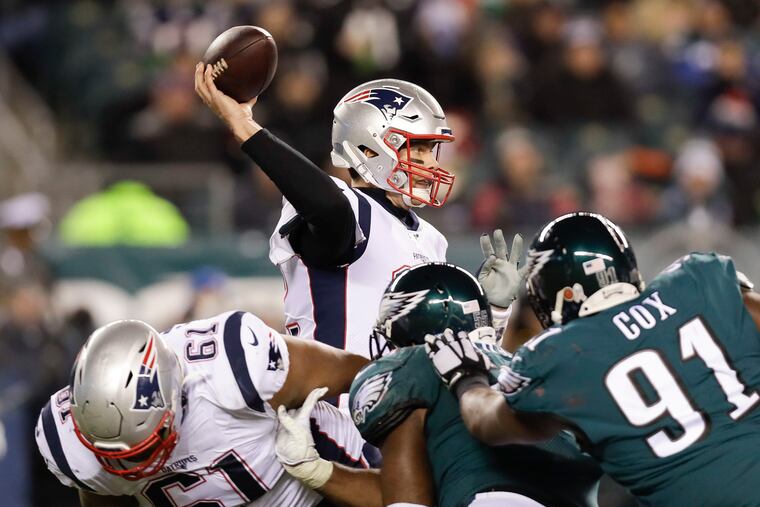A new Brady-Belichick book shines a fresh, favorable light on ... the Eagles | Mike Sielski
Seth Wickersham's "It's Better to Be Feared" shows how great the Patriots dynasty was. The Eagles couldn't stack up to it, but they came closer than most teams.

The truest cliché about Philadelphia is one that frequently needs repeating and reaffirming: This is a parochial region, in so many respects its own unique ecosystem. Sometimes it feels like Stephen King has dropped an invisible dome over the earth from Trenton to Dover. When I took a job in New York in 2010 and moved up to northern New Jersey, I had Philly family members and friends who wondered what would possess me to leave, as if I were relocating not to the world’s economic and cultural capital, just 90 miles away, but to the dark side of the moon.
When it comes to the area’s love of and fixation on sports — and on the Eagles, in particular — that provincialism can often warp our perspective. Put simply, we can fixate on our own teams, our own athletes, our own past to the exclusion or ignorance of a broader context. We can get too close. Examine a butterfly under an electron microscope, and it will seem a monster, ugly and terrifying. It’s only when you view it at a relative distance that you discern its beauty.
Now, for even the most Pollyannaish of Eagles fans, it would be a stretch to describe the totality of recent Eagles history as beautiful. The 2017-18 season certainly would meet that standard, and from the prime of Donovan McNabb’s career to the first season-and-a-half of Chip Kelly’s tenure here, there have been several years that gave people here the feeling that they most seek from any sports team: the sense that something great was happening or might happen, and that you were lucky to be along for the ride. But there has been plenty of mediocre and downright terrible football from the Eagles, too, especially over last season and the first three games of this one, and those stretches can seem to last forever because they hurt so much — because everyone cares so much.
That’s the local perspective, the six-inches-in-front-of-your-face perspective. So now let’s consider that wider view. In his terrific new book, It’s Better to Be Feared: The New England Patriots Dynasty and the Pursuit of Greatness, ESPN’s Seth Wickersham delivers the defining work on the defining partnership of the NFL’s last quarter-century, maybe its last half-century: the relationship between Bill Belichick, arguably the league’s greatest coach, and Tom Brady, arguably its greatest quarterback. Six Super Bowl victories, three additional appearances in the big game, scandals, gossip, the question of who was more responsible for the Patriots’ success: There’s no story like it. That Brady won another Super Bowl last season, with the Buccaneers, only amplified the fascination with and debate around him and his former coach. Sunday night’s Patriots-Bucs game, even in this age of fragmented media, could set ratings records for NBC.
The pair have so dominated discussion around the league since 2001 that every other development or storyline can seem secondary in relation to them. More, every franchise’s achievements, such as they are, can seem a failure in comparison. The word “Eagles” appears 55 times in Wickersham’s book, and most of those mentions frame the franchise, particularly during the Andy Reid-McNabb era, as one that has done a lot of things right … just not as many as Brady and Belichick. Which, in Wickersham’s mind, is nothing to be ashamed of. In the history of the NFL, nobody has done as many things right as Brady and Belichick.
“From 2001 to 2004,” Wickersham writes, “New England and Philadelphia each produced 48-16 regular-season records. The Eagles did everything right. They were a smart and innovative team, constructed both methodically and radically. …
“The Eagles had done the hard part. They found two organizational cornerstones, at the most difficult and vital jobs. And yet, there was an ineffable difference between them and New England. … The Eagles reached four straight NFC Championship Games, losing three before finally winning one, against the Atlanta Falcons. The Patriots, by contrast, were on the verge of making history, of doing what few other teams had ever done. Nobody on either team did anything wrong. It was randomness. It was the unpredictable confluence of events. It was luck.”
Understand Wickersham’s point here: He’s not saying that Belichick and Brady were lucky to win as much as they did. He’s saying that the Patriots were lucky to hire the former and draft the latter, and he’s right. They were. Belichick’s career appeared to be a pile of ashes after his infamous one-day stint as the Jets’ head coach in 2000, and 198 players were drafted that April before New England got around to selecting Brady. The Patriots bottled a bolt of lightning twice in a four-month span, and it turned them into a dynasty. The Eagles weren’t so fortunate, but they came about as close as one could expect, and they managed to get the better of Brady and Belichick in February 2018.
“The Patriots were used to being the team in superior physical shape in the Super Bowl,” Wickersham writes. “But, the week before the game, [Doug] Pederson had stopped things halfway through practice and sent the players into the locker room, preparing them for the long halftime. Now they were fresh and aggressive with the game in the balance.”
» READ MORE: Eagles film: Was Jalen Hurts bad, or bad because of Nick Sirianni’s offense?
You know the rest. There will yet be plenty of anger and lamentations over the present state of the Eagles. That’s to be expected. That’s what makes Philadelphia the sports city that it is — marvelous and challenging and passionate and demanding, sometimes excessively so. Just remember, once in a while, to step back from the microscope, blink, and look around.